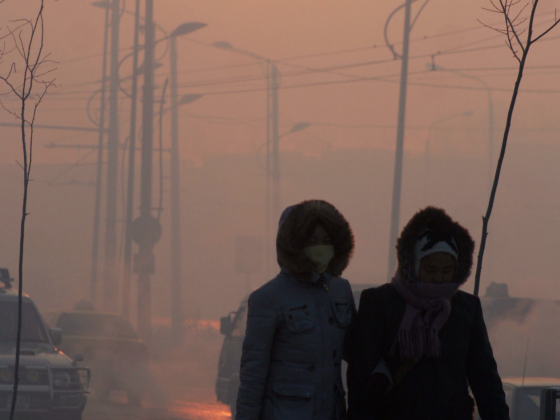If you think air pollution in China has been bad, just look at Mongolia.
Levels of particulate matter in the air have risen to almost 80 times the recommended safety level set by the World Health Organisation – and five times worse than Beijing during the past week’s bout with the worst smog of the year.
Mongolian power plants working overtime during the frigid winter belch plumes of soot into the atmosphere, while acrid smoke from coal fires shrouds the shantytowns of the capital, Ulaanbaatar, in a brown fog. Angry residents planned a protest, organised on social media, on Monday (Dec 26).
The level of PM2.5, or fine particulate matter, in the air as measured hourly peaked at 1,985 microgrammes a cubic meter on Dec 16 in the capital’s Bayankhoshuu district, according to data posted by government website agaar.mn. The daily average settled at 1,071 microgrammes that day.
The World Health Organisation recommends PM2.5 exposure of no more than 25 micrograms over 24 hours.
In Beijing, the year’s worst bout of noxious smog prompted officials to issue the year’s first red alert and order 1,200 factories to close or cut output. Earlier this week, PM2.5 levels exceeded 400 in the capital, and Chinese officials on Tuesday cancelled 351 flight departures because of limited visibility. The highest daily average in the past week, on Wednesday, registered 378. Worse, the PM2.5 reading in Shijiazhuang, capital of Hebei, exceeded 1,000 microgrammes per cubic metre earlier this week, according to the China National Environment Monitoring Centre.
Mongolia’s contracting economic growth and a widening budget gap have left authorities few resources to fight the dangerous smog.
HOSPITALS FULL
One thing the government has done is cut the nighttime electricity tariff by 50 per cent to encourage more residents to heat their homes with electric heaters instead of raw coal or other flammable material that is often toxic.
On Wednesday, Defence Minister Bat-Erdene Badmaanyambuu announced that a 50-bed wing of Ulaanbaatar’s military hospital will open up for children with pneumonia, as city hospitals were filled to capacity, according to a statement on the government’s website.
Public anger over the government’s handling of pollution has been growing on social media, where residents share pictures of the smog, encourage methods of protection and call on the government to do more to protect citizens.
The air pollution protest next week was being organised for Sukhbaatar Square, the capital’s central plaza. A crowdfunding campaign to purchase 100 air purifiers for hospitals and schools raised almost US$1,400 (S$2,030) in four days.
“Most of my colleagues’ children are hospitalised or at home struggling with respiratory problems,” Mr Lhagva Erdene, news director at Mongol TV station, said in an e-mail. “Public hospitals have parents and babies out in the corridors. We feel helpless and frustrated for the inaction of our government.”
IMPENDING CRISIS
Earlier this month, the United Nations Children’s Fund (UNICEF) warned of an impending crisis if the smoke levels are not reduced, calling children under five and those still in the womb the most vulnerable.
“Children are projected to suffer from unprecedented levels of chronic respiratory disease later in life,” the UNICEF report said, warning of the rising economic costs of these diseases unless “major new measures” are urgently enacted. “The alarming levels of air pollution in Ulaanbaatar during the long winter cannot be neglected any longer, as their short- and long-term negative health impact has been demonstrated especially for children.”
A 2013 study by Canada’s Simon Fraser University concluded that 10 percent of deaths in Ulaanbaatar were related to complications from air pollution.
Neither the ministers for foreign affairs nor the environment replied to requests for comment.
A longer-term plan to convert areas known as ger districts, where hundreds of thousands of people live in makeshift housing including tents, into apartment complexes has been stymied by an economic crisis that has pushed the government to seek economic lifelines from partners including the International Monetary Fund and China.
Pollution levels in both Mongolia and China were abating as of Thursday.
Source: BLOOMBERG











